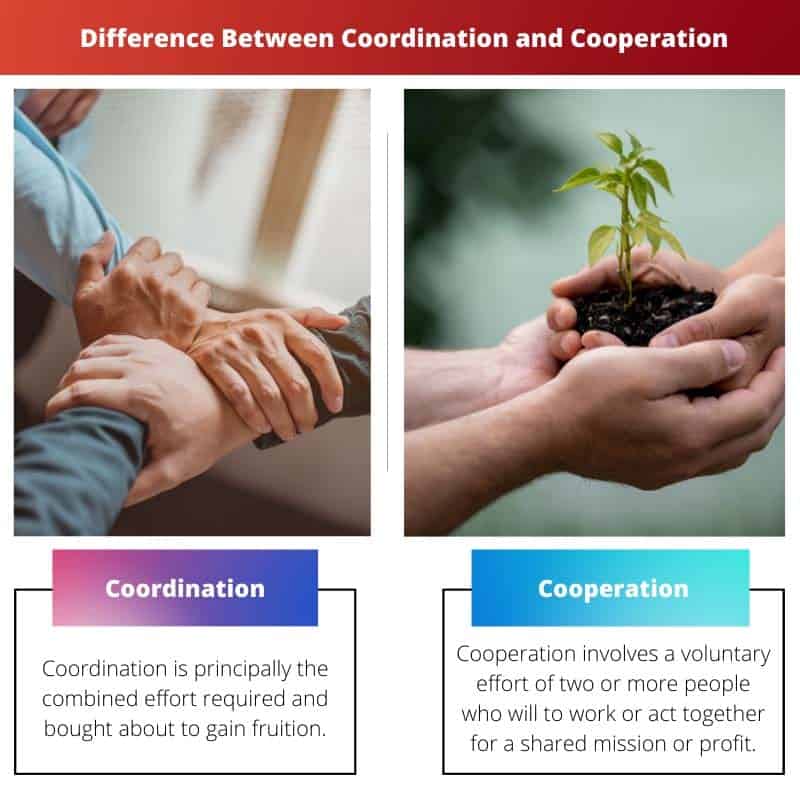Coordination involves aligning actions and efforts towards a common goal, through communication and planning. Cooperation, on the other hand, emphasizes working together harmoniously, pooling resources and skills to achieve mutual benefit, without the need for strict organization or centralized direction.
Key Takeaways
- Coordination is organizing and synchronizing the efforts of individuals or groups to achieve a common goal.
- Cooperation is the process of working together with others for a common goal.
- Coordination is focused on ensuring that everyone is working in sync, while cooperation is focused on sharing resources and working together.
Coordination vs Cooperation
Coordination refers to organizing and integrating various activities, tasks, or resources to achieve a specific objective. Coordination involves organizing and integrating different activities, while cooperation involves the willingness of individuals or groups to work together.

The main attributes to draw a line between coordination and cooperation include connection, communication, goals, resources, power, commitment, collaboration, co-exist, and accountability.
On the other hand, cooperation is a discretionary action of individuals to work collectively for a mutual profit. It requires joint efforts of all the organisation’s members to achieve a defined target.
Comparison Table
| Feature | Coordination | Cooperation |
|---|---|---|
| Definition | The organized arrangement of various elements to ensure smooth functioning and achieve a common goal. | The collective effort of individuals or groups to work together and achieve a shared objective. |
| Focus | Organization and synchronization of activities, schedules, and resources. | Joint effort, sharing information, and mutual support. |
| Approach | Top-down or centralized in many cases, with clear instructions or procedures. | Voluntary participation and shared decision-making, arising organically. |
| Emphasis | Efficiency and reducing conflict through clear communication and defined roles. | Building relationships, trust, and collective responsibility for the outcome. |
| Example | Assembly line in a factory, traffic management system, team playing a sport with assigned roles. | Group project, volunteering team working on a community initiative, brainstorming session. |
| Relationship | Coordination is a precursor to effective cooperation. | Cooperation can enhance coordination by fostering communication and buy-in. |
What is Coordination?
Coordination is the process of harmonizing activities and efforts within an organization or among individuals to achieve common goals effectively and efficiently. It involves bringing together various elements, resources, and stakeholders in a synchronized manner to facilitate smooth operation and progress towards shared objectives.
The Essence of Coordination
Coordination is not merely about organizing tasks; it’s about ensuring that all components of a system work together seamlessly. This includes aligning strategies, resources, timelines, and communication channels to prevent conflicts, redundancies, or inefficiencies.
Key Components of Coordination
- Communication: Effective communication is fundamental to coordination. It ensures that all stakeholders are informed about their roles, responsibilities, and the overall objectives. Clear and open communication channels facilitate the exchange of information, feedback, and ideas, fostering collaboration and alignment.
- Integration of Efforts: Coordination involves integrating the efforts of different individuals or departments towards a common purpose. This integration may require aligning timelines, priorities, workflows, and resources to avoid duplication of efforts and ensure optimal utilization of resources.
- Conflict Resolution: Conflicts or disagreements can arise in any collaborative endeavor. Coordination involves managing these conflicts constructively by facilitating dialogue, negotiation, and compromise. Addressing conflicts promptly and effectively is crucial to maintaining harmony and momentum within the team or organization.
- Monitoring and Feedback: Continuous monitoring of progress and performance is essential for effective coordination. Feedback mechanisms allow stakeholders to assess whether actions are contributing to the desired outcomes and make necessary adjustments in real-time to stay on track.
Importance of Coordination
Coordination plays a pivotal role in enhancing organizational efficiency, productivity, and overall performance. By fostering synergy among diverse elements and ensuring alignment towards common goals, coordination minimizes wastage of resources, reduces conflicts, and enhances the agility and adaptability of the organization in response to changing circumstances.

What is Cooperation?
Cooperation is the act of working together willingly and harmoniously towards a common goal or shared interest. It involves individuals, groups, or entities voluntarily pooling their resources, skills, and efforts to achieve outcomes that benefit all parties involved. Cooperation thrives on mutual trust, respect, and a willingness to collaborate for mutual benefit.
The Essence of Cooperation
Cooperation goes beyond mere coordination or collaboration; it embodies a spirit of mutual assistance, empathy, and solidarity. It entails individuals or groups recognizing their interdependence and choosing to align their interests and efforts to achieve outcomes that are mutually advantageous.
Key Components of Cooperation
- Mutual Understanding and Trust: Cooperation hinges on mutual understanding and trust among participants. It requires individuals or groups to have confidence in each other’s intentions, capabilities, and commitment to the common goal. Building and maintaining trust is essential for fostering cooperation over the long term.
- Shared Goals and Interests: Cooperation is most effective when all parties share common goals or interests. This alignment of objectives provides a compelling reason for collaboration and ensures that efforts are directed towards achieving outcomes that benefit everyone involved.
- Open Communication and Collaboration: Effective communication is a cornerstone of cooperation. It involves sharing information, ideas, and feedback openly and transparently to facilitate collaboration and decision-making. Open communication fosters a sense of inclusivity and ownership among participants, enhancing their engagement and commitment to the cooperative effort.
- Equitable Distribution of Benefits and Responsibilities: Cooperation thrives when benefits and responsibilities are distributed equitably among participants. This fairness ensures that all parties feel valued and respected, motivating them to contribute their best efforts towards achieving the shared goals.
Importance of Cooperation
Cooperation plays a crucial role in promoting teamwork, innovation, and collective success in various contexts, including organizations, communities, and international relations. By leveraging the strengths and resources of multiple stakeholders, cooperation enables the achievement of outcomes that may be beyond the reach of individual efforts alone. Moreover, cooperation fosters a sense of belonging, solidarity, and social cohesion, contributing to a more harmonious and inclusive society.

Main Differences Between Coordination and Cooperation
- Objective:
- Coordination focuses on aligning actions and efforts towards a common goal, emphasizing synchronization and efficiency.
- Cooperation involves willingly working together towards a shared objective, emphasizing mutual support, collaboration, and mutual benefit.
- Nature of Interaction:
- Coordination involves organizing and synchronizing tasks, resources, and efforts to prevent conflicts and redundancies.
- Cooperation entails voluntary collaboration and mutual assistance, driven by shared goals, trust, and a willingness to work together harmoniously.
- Approach:
- Coordination requires formal structures, processes, and communication channels to facilitate alignment and integration of activities.
- Cooperation can occur spontaneously or through informal arrangements, focusing on building relationships, trust, and mutual understanding among participants.
- Emphasis:
- Coordination emphasizes efficiency, optimization of resources, and minimizing conflicts or overlaps in activities.
- Cooperation emphasizes collaboration, synergy, and collective achievement, prioritizing mutual benefit and shared success.




